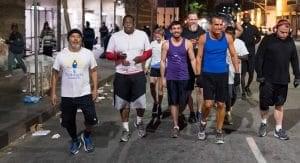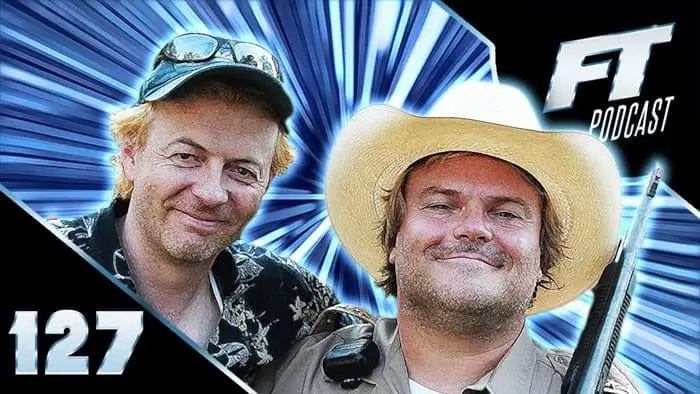
Addicts can follow many different paths to recovery, some more effective than others. Judge Craig Mitchell of the Los Angeles Superior Court has helped provide an unusual one for the homeless on the city’s Skid Row neighborhood — running marathons.
Skid Row Marathon brings us inside the lives of some who are destitute and stranded in a squalid section of Los Angeles whose name is synonymous with poverty and hopelessness. The film presents a clear-eyed view of the challenges that substance addicted people face in breaking free from drugs, alcohol, and crippling poverty.
The film opens with Judge Mitchell in court, meting out long sentences to convicted felons. Later he talks about the burden of handling such dark but necessary work. What in part offsets such grim duties is running the Skid Row Marathon Club. Something he established with residents of the Midnight Mission, a shelter and rehabilitation program serving the downtown Los Angeles area. For some, belonging to a group with concrete goals that requires self-motivation and a lot of sweat is the right combination to lift them out of the pit into which they’ve sunk.
“Skid Row Marathon brings us inside the lives of some who are destitute and stranded in a squalid section of Los Angeles whose name is synonymous with poverty and hopelessness.”
This is a story about struggling and sometimes winning — the film acknowledges that only about half of those seeking treatment in any program are successful in ridding themselves of addiction. So most of the participants we meet are the ones who find success through marathoning.
We see them gathering outside the mission before sunrise and training. We meet David, a dedicated artist with 23 arrests. Mitchell comments that if he wasn’t a United States citizen, David would have been deported. Ben, another mission resident, weighed 300 pounds when he began running with the group and is down to a svelte weight by the time we meet him. The former bassist for Los Angeles rock band U.P.O., he was on track to a successful musical career until his addictions helped bring him down.
When we meet Raphael, a former gang member who served time for murder, he’s out of prison and on parole due in large part to Mitchell’s vouching for him. He’s become a dedicated member of the marathon club and desperately wants to turn his life around.
Mody, who is from Senegal, was a student in the United States with a promising career who like the others ended up on Skid Row.
Rebecca, from suburban Seattle, was a heroin and cocaine addict, homeless and living on the streets with her young son before coming to Los Angeles. The details of each one of the runners’ lives are reminders of how easy it would be for any of us to follow the same destructive path if just a few events or circumstances of our lives were different.
“This is a story about struggling and sometimes winning — the film acknowledges that only about half of those seeking treatment in any program are successful in ridding themselves of addiction.”
Along with the prospect of self-improvement and a new start, Mitchell provides an added incentive for the group: each year the club will travel to, and participate in, a marathon held in a foreign land, and Judge Mitchell picks up the tab. First stop is Ghana — Raphael being the only member who couldn’t participate. The parole board wouldn’t let him leave the country. The race is a tough one, with high humidity, triple-digit heat and diesel fumes choking the air. After seeing children playing amid piles of garbage in the streets, one of the runners remarks that he’s grateful for what he has at home, even the little things.
The film wraps us up in the humanity of the judge’s efforts to help those who need support and guidance most. He recalls with a lump in his throat the time in the 1960s when his mother brought him, then a youngster, to the site of the Watts riot in the aftermath of that explosive summer. She wanted him to understand the terrifying conditions and brutal poverty that some must endure in the wealthiest nation on earth. It was a scene he never forgot, and that perhaps laid the groundwork for his dedication toward helping the disadvantaged.
Later in the film, after the trip to Ghana, the group heads for the marathon in Rome. One of the film’s most touching moments is a scene between Mitchell and David, who has since left the mission and is employed and living independently. He’s reluctant to accept the invitation to run with the group in Italy because he feels unworthy of the privilege. But Mitchell presses onward, explaining that he wants David to see all of the great art in Rome.
An added element of drama is Ben awaiting word from the music conservatory he’d applied to. The verdict will arrive when the runners are in Italy. Even if none of the group’s runners expect to win the race, the admissions committee decision gives us something to root for.
Skid Row Marathon is an uplifting experience that doesn’t allow sport and competition to overshadow the stories of the runners’ lives. Win or lose, we know the stakes for each are much higher than any athletic competition could provide. In the end, marathoning is a near perfect metaphor for the arduous road toward rehabilitation for these people. Theirs is truly a long run. There’s really no final finish line to be crossed, only little victories every day for those who stay focused and stick with the program. It’s a lesson we could all benefit from.

Skid Row Marathon (2019) Directed by Mark Hayes. Written by Mark Hayes. Starring Judge Craig Mitchell, David Askew, Ben Shirley, Rafael Cabrera, Rebecca Hayes, Mody Diop.
9 out of 10 Golden Wreaths

